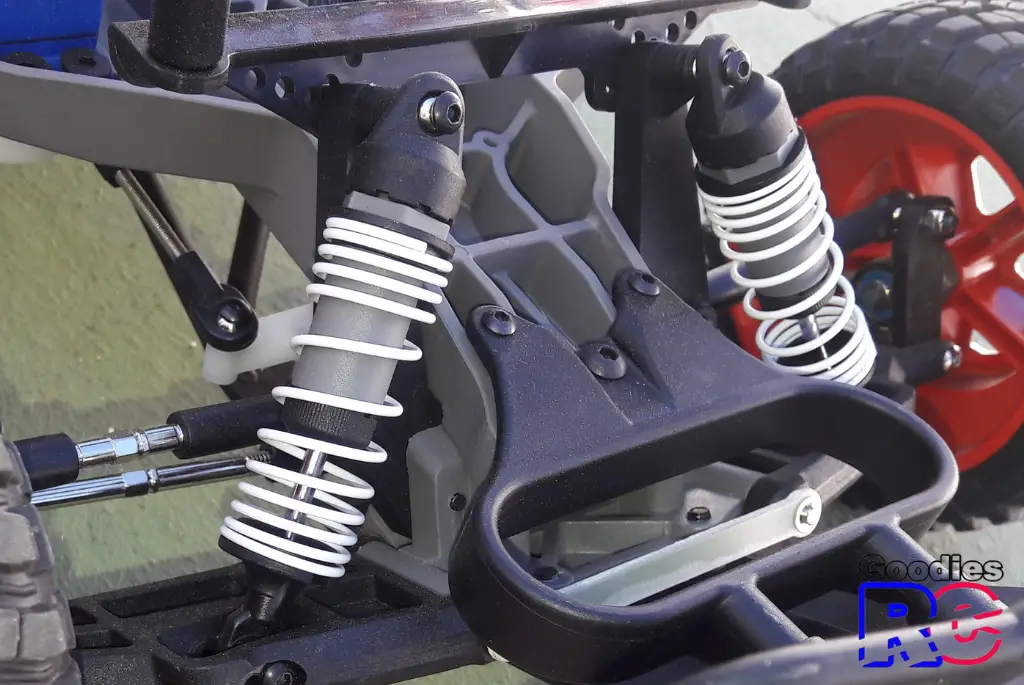If you enjoy racing and bashing your RC car on a regular basis, especially on bumpy types of tracks, then your shock absorber will eventually wear out. However, if you choose the right kind of shock oil, it can last much longer.
In this article, you will learn everything you need to know about RC shock oils from start to finish. So without further ado, let’s get into it!

What Oil To Use In RC Shocks?
It is recommended to use silicone shock oil for your RC shocks as it is safer and provides more lubrication than motor oil. RC shock oils come in varying weights, and you should select the type of shock oil depending on the stiffness you want in your RC shock.
Note that the thickness of shock oil is denoted in terms of the CST or WT. And you can expect that:
The higher the number, the thicker your RC shock oil will be.
| Heavier Shock Oil | Slower Rebounds | Stiffer Spring |
| Lighter Shock Oil | Faster Rebounds | Less Stiff Spring |
As the name shock absorber itself suggests, its purpose is to absorb bumps, shocks and thus stabilize and protect your RC car from crashes or shocks.
But you will need to fill oil inside the shock absorber because without the presence of a lubricating agent – the oil, the shock will eventually tend to wear out faster. And if your shock absorber gets damaged, then you might even have to replace it with a new one. It is most likely that you won’t be interested in falling into such troubles, right?
A shock absorber has two parts: a cylinder head and a piston. Whenever your RC car falls on a particular bump or gets some shock, the piston in the shock absorber moves up and hits the cylinder head.
This piston and cylinder keep on rubbing against each other many times, so there arises the need for a lubricating agent that is nothing but the RC oil.
An appropriate RC oil can smoothen the whole process of absorbing the shock inside the shock absorber. The weight of the RC shock oil can vary the stiffness of the RC shock absorber spring.
Check out this post: The Complete Guide To RC Channels
Hence, different RC cars use different RC shock oil weights. The type of shock oil you should use for your RC shock will depend on the following things:
- Shock Absorber’s Size: A small shock absorber will use less oil than a bigger shock absorber. So depending on the size of your RC shock absorber, you need to purchase the shock oil quantity and type accordingly.
- Spring’s Stiffness: This is the most crucial aspect you will consider while selecting the shock oil for your RC car. If you would like to have a stiff spring and a suspension system, you will need to choose a heavyweight oil. But if you want less stiff suspension, you will have to select a lighter shock oil.
- Style Of Driving: If you take huge jumps with your RC cars, you will need to select heavier weight oils. But if you want to drive your RC car on rougher surfaces, through small bumps and jumps, then lighter oil will be what you should be looking for.
- RC Car’s Weight: If you have been into this RC hobby for some time, you probably know that various size RC cars are available on the market. And so, the shock oil available is also of different types. You need to select the one that suits well with your RC car type. As a general rule, you should stick with the principle of getting higher WT or CST oil for higher-weight RC cars.
- Weather Conditions: It is important to note that the oil’s viscosity can change based on the change in weather. During winter, you should have a low viscosity RC shock oil. On the other hand, you should aim for a higher viscosity oil for hot temperatures. You can increase or decrease 100 CSt for a 20-degree temperature change as a rule of thumb.
Want to improve your RC Car’s Drifting? Check out my post where I share 9 ways to make RC Car drift faster.
What Is RC Shock Oil Made Of?
There are mainly two types of oil used in RC shocks: motor oil and silicone oil. While you can use motor oil, it is not recommended since it is not environmentally friendly compared to silicone oil, and also, the motor oil can damage the parts of the RC car.
Hence, you should use silicone oil for RC shock. Silicone oil is better than other shock oil such as motor oil for the environment.
Their lubrication is more effective, and they are safer than motor oil. Moreover, they are not flammable.
Plus, they are cheaper than motor oil and act as an electrical insulator. On top of that, since silicone oils are widely available, it is easier to choose the right one for your RC car.
What Silicone Oil Is Used For RC Cars?
| Silicone Shock Oil: | Price: |
| TEAM LOSI RACING Shock Oil | Check Here (on Amazon) |
| Traxxas 1667 30wt Silicone Shock Oil | Check Here (on Amazon) |
| Team Associated 5422 30 Weight Silicone Shock Oil | Check Here (on Amazon) |
Now let’s suppose that you don’t have any shock oil with you at any given moment. At the same time, you feel that the hobby shop from where you could grab some silicone oil is far away.
Then you might get tempted to use the motor oil in your RC car. But wait, is it safe to use it? Let’s discuss!
Can Motor Oil Be Used As RC Shock Oil?
Motor oils can be used as RC shock oils, but they should be a last choice when considering RC shock oils. This is because motor oil contains petroleum products that can damage an RC shock. Hence, it is recommended to use silicone oil as RC shock oil.
Also Read: What Is The Fastest RC Motor?
What Shock Oil Weight Should I Use In My RC Cars?
| RC Car Type: | Oil Weight |
| 1:10 Buggy/Short Course 2WD | Front: 300–350 CST Rear: 250–350 cst |
| 1:10 Buggy 4WD | Front: 350–450 cst Rear: 300–400 cst |
| 1:8 Buggies and Truggies | Front: 400–600 CST Rear: 350–500 cst |
| 1:10 Short Course 4WD (newer models, for example, Tekno) | Front: 350–450cst Rear: 350–400cst |
| 1:10 Touring 4WD | 400 cst |
Source: eurorc.com
Remember, the thicker the RC shock oil will be, the more viscosity it will have, and as a result, it will flow slower and cause less rebound and stiffer spring.
How fast and when the chassis will roll depend upon the RC shock.
Whereas, how far the RC chassis will roll will depend on the RC spring.
Tip: If you make your RC car take a lot of big jumps, then make sure that your suspension takes the damping instead of the actual chassis of your RC car. And for that, you should use higher oil weights.
“Higher the oil weight – More stability in the suspension system – More traction – Better Steering.”
On the other hand, since the lighter oils have less viscosity, they will flow faster and cause more responsiveness in the shock absorber system.
The lighter oils are mainly used for lumps, bumps, and small jumps. They will give more reactivity to your suspension system.
To learn more about the RC shock oil weights, watch this video:
Check out my detailed article: RC Shock Oil Weight: A Complete Guide
Can You Mix RC Shock Oil?
As a general rule, you can mix shock oil weight, and even if you mix different brand shock oils, no problem will occur. However, it is essential to consider the right viscosity of the oil as mixing the oils can change the viscosity of the resulting oil.
By the way, in case you ever wondered whether RC cars break easily, check out my detailed article: Do RC Cars Break Easily? Everything You Need To Know
How To Fill Oil Inside The RC Shock?
Here’s how you should fill oil inside the RC shock:
- Take the RC shocks off the RC car.
- Remove the spring that is present on the RC shock.
- Unscrew and remove the cap at the top part of the shock.
- Fill the oil slowly inside the RC shock to prevent any air from going inside.
- Make sure to keep some room at the top and don’t overfill the shock.
- You can leave the setup for a few hours to allow the air to come out of the shock.
- Then Screw the cap back on the RC shock.
- Reattach the spring.
- Finally, place the RC shock back to its original place in the RC car.
For a more in-depth guide, I have a whole article based on how to change the shock oil on your RC car.

Want to see how to fill oil inside your RC shock visually? Watch this video:
When Should I Change My Shock Oil In RC?
Generally, it is recommended to change RC shock oil 2-3 times in a season. Changing the RC shock oils becomes essential when you notice there isn’t enough oil inside the shock or if dirt gets into it.
Here are some possible situations where you may have to change your RC shock oil:
- While making changes to the damping setup of your RC car
- When RC shocks are damaged, and it is required to take them apart
- When there isn’t sufficient oil present inside the RC shock
- Dirt gets into the shock absorber as well in the oil because of driving the RC car in a dusty region
One crucial thing to note is that when dirt and dust get into RC shock oil, your RC shock parts, and the seal will tend to wear out faster than driving the RC car with a clean RC shock oil.
Now, until now, we talked about RC shock oils. But wait, do we need to apply grease to our RC gears. And the straight answer is yes because the RC cars have mechanical parts. And for better functioning of those parts, a proper lubricant like grease is also required.
What Grease Should I Use For RC Cars?
In general, you should use the grease that comes with your RC car, which is likely to be silicone grease or lithium-type grease. However, if you use your RC car in wet conditions, you should choose an aluminum-complex waterproof grease.
The primary role of grease in RC cars is to provide lubrication and reduce the amount of resistance, wear and tear between the mechanical parts of your RC car.
One important thing to note is if you have already applied grease on your RC car, then try de-greasing it first. Some grease may not work well with the others, so it is recommended not to mix them.
Here are a few points you should keep in mind while selecting the proper grease:
- Water Resistance: It is vital to select the grease that is waterproof because at least at some point, your RC may come in contact with water. And if you apply a non-water resistant grease, then you reapply it frequently, which is not feasible, along with the fact that the non-water-resistant grease may also react with water and cause more harm. (Also, See: Can A Nitro Rc Car Be Run In Rain?)
- Performance: Select the type of grease that will bond better with the metal components of your RC. You wouldnt be happy to have a lubricant that starts to smear out when you brake hard.
- Application: Applying the grease in your RC car is not a clean task. But if it comes in good packaging that can be used easily, you should look at that type of grease.
- Temperature Stability: The lubricant you use can get affected due to the change in temperature, which can affect its performance. So you need to select the grease that works well and remains stable in the majority of types of temperatures.
- Viscosity: If you select grease that is too runny, it will create a mess, and it may start dripping when you run your RC car. And you dont really want to get into such issues. So you need to look for the right kind of grease with optimal viscosity.
Conclusion
In short, RC shock oils are used in RC shocks to provide lubrication. The thicker the oil, the stiffer the shock’s spring and vice versa. Now, before you go, I would highly encourage you to check out my detailed post on RC tires cracking if you are interested in knowing why RC tires crack and how to keep them from cracking.
If you found this article helpful, you may want to check out these articles;

